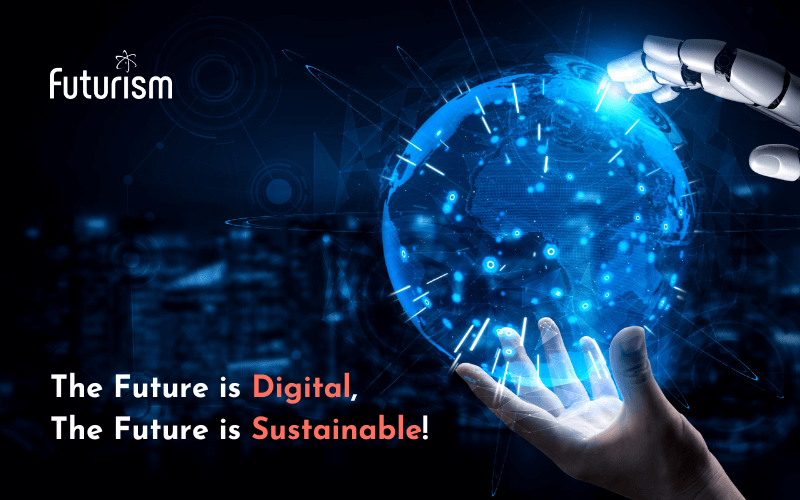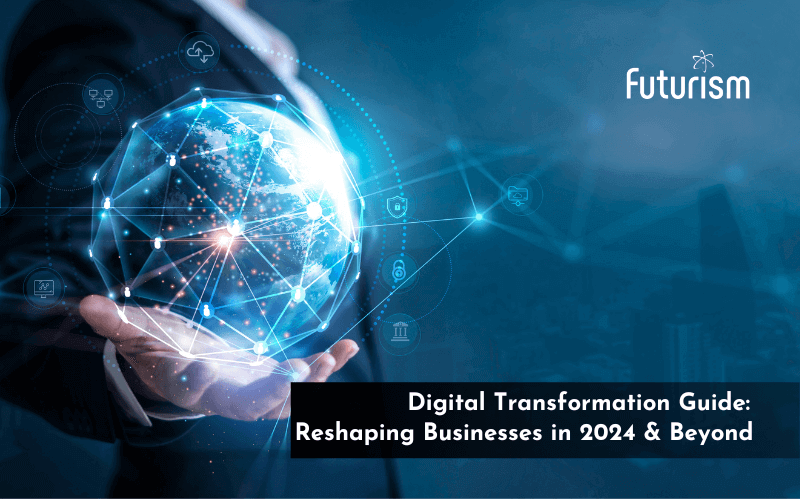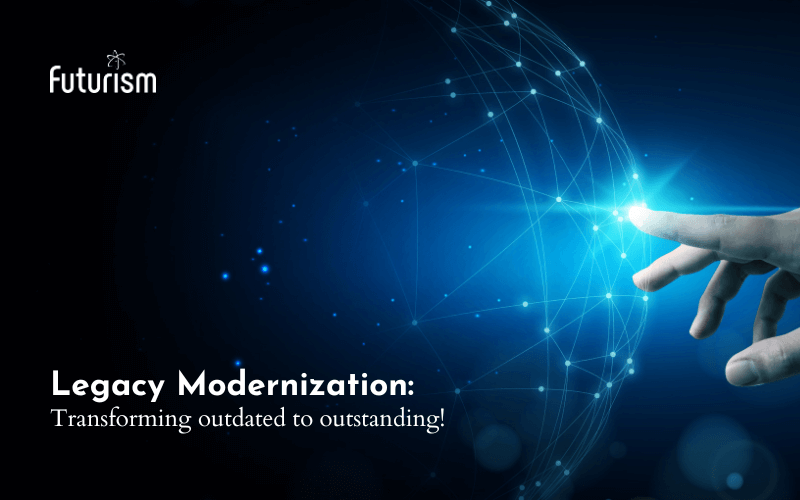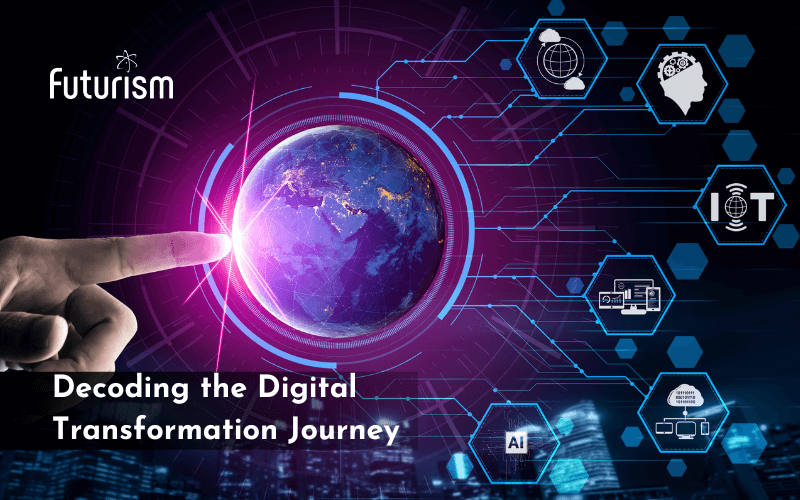Digital Maturity: What It Is and Why It Matters?

Futurism Technologies
December 7, 2023 - 2.2K
5 Min Read
In today’s technologically-driven and highly-connected era, businesses are not merely engaging in the digital transformation race; they are striving to attain a state of digital maturity, a transformative journey that promises sustained growth, profitability, and resilience. Digital maturity, once considered a buzzword, has become a strategic necessity for companies at the forefront of innovation.
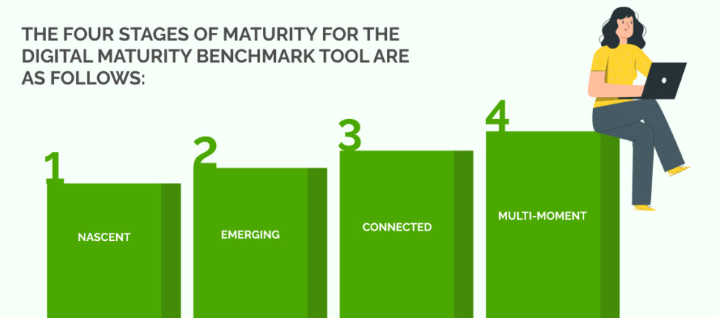
Understanding Digital Maturity
Digital maturity goes beyond the mere adoption of new technologies; it represents an organization’s ability to harness digital transformation comprehensively across its technology stacks, staffing resources, and organizational culture. In simple terms, digital maturity is nothing but a continuous process of transformation and innovation that requires a strong commitment from leadership, a supportive organizational culture, and a skilled workforce.
Digital maturity serves as the yardstick for a company’s readiness to capitalize on market opportunities and drive business outcomes through digital innovation.
Read also: The Future is Now – Decoding the Digital Transformation Journey
The Significance of Digital Maturity in Business Growth
The COVID-19 pandemic has been a catalyst for digital transformation worldwide, pushing companies to accelerate their technology adoption to unprecedented levels. Businesses that have embraced digital maturity are better positioned to weather the storms of market fluctuations and economic downturns. Their ability to leverage technology to streamline operations, enhance customer experiences, and drive innovation provides them with a competitive edge that can help them thrive even in challenging times.
Statistics underscore the significance of this acceleration, with 63% of leaders reporting an expedited digital transformation timeline due to the pandemic. This transformation is not superficial; companies with higher digital maturity levels have reported up to 43% higher net profits than their industry averages.
In another study by McKinsey & Company, it was found that companies with high levels of digital maturity were significantly more likely to report revenue growth during the recession of 2008-2009. This resilience is a testament to the power of digital maturity to transform businesses into agile, adaptable, and future-proof organizations.
Read also: Transforming Your Business – Overcoming 5 Toughest Digital Transformation Challenges
Digital maturity has several key attributes that underpin its significance, including enhanced access, automation, customer-centricity, efficiency, flexibility, innovation, operational efficacy, and quality. These attributes collectively drive outcomes that foster business growth and ensure a competitive edge in the market.
The Impact of Digital Maturity on Digital Transformation
Digital transformation is the tangible manifestation of change through digital technologies, while digital maturity defines an organization’s capacity to execute this change. The alignment between digital maturity and digital transformation is crucial to avoid costly setbacks. A well-defined Digital Maturity Model (DMM) acts as a strategic roadmap for transformation, ensuring alignment and facilitating seamless transition.
Read also: Your Ultimate Digital Transformation Checklist for 2023 and Beyond – A Futurism Advisory
Understanding Digital Maturity Models (DMMs)
Digital Maturity Models (DMMs) serve as frameworks to assess a company’s digital maturity level and guide its growth trajectory. These models range from generic to industry-specific, offering benchmarks and insights that inform strategic planning.
A notable example is the model (demonstrated above) developed by Google and the Boston Consulting Group, which depicts four stages of digital maturity: Nascent (Rising), Emerging, Connected, and Multi–Moment, each representing a progressive integration of data and digital processes.
The Four Stages of Digital Maturity Explained:
1. Incidental: At this stage, digital activities occur sporadically and without strategic direction.
2. Intentional: Here, there is a deliberate strategy behind digital initiatives, though they may not be fully integrated across the business.
3. Integrated: Streamlined digital strategies supported by leadership, reflecting a higher level of maturity.
4. Optimized: This pinnacle stage signifies full integration of digital transformation into the company culture paving way for agile responses to market shifts.

A Holistic Approach to Increasing Digital Maturity
For many organizations, nurturing their digital maturity goes beyond adopting new technologies. It involves creating a cohesive ecosystem where technology, people, and processes work harmoniously to drive business growth. The journey toward digital maturity starts with a clear understanding of the current state and a vision for the future, underpinned by a commitment to continuous improvement and strategic investment in technology.
By welcoming a holistic approach to digital transformation, organizations can unlock a world of possibilities, enhancing efficiency, customer experience, and overall business performance with faster time to market. Digital maturity is not an option, but a necessity for businesses that aspire to thrive in today’s interconnected and data-driven world.
Read also: 5 Ways to Prepare Your Business for Digital Transformation
Expanding Horizons: Leadership, Customer-Centricity, and Sustainability
Leadership and organizational culture play a pivotal role in achieving digital maturity, driving the transformation process and promoting a culture of innovation. A customer-centric approach, rooted in digital tools and data insights, can create a competitive edge. Furthermore, businesses must consider sustainability and social responsibility as integral components of digital maturity, aligning their digital initiatives with ethical and ecological considerations.
Embracing Innovative Technologies and Trends
To stay ahead, businesses should keep an eye on emerging technologies such as Artificial Intelligence (AI), Generative aka GenAI blockchain, edge computing, the Internet of Things (IoT), etc. These digital innovations are pivotal in achieving digital maturity, and companies must adapt and integrate them into their digital strategies.
Digital maturity is a comprehensive measure of an organization’s digital readiness and its ability to leverage technology for transformative growth. As we look ahead, the pursuit of digital maturity will continue to shape the business landscape, demanding a strategic, data-driven, and collaborative approach to digital transformation.
How Futurism Technologies Facilitates Digital Maturity
1. Strategic IT Roadmaps: Futurism helps businesses chart out strategic IT roadmaps that align with their digital maturity goals, ensuring that technology investments are strategic and drive value, all in a cost-iterative manner.
2. Cybersecurity Integration: Recognizing the increased risks that come with digital advancement, Futurism integrates robust cybersecurity solutions into the very fabric of businesses, safeguarding business operations and strengthening their security posture/infrastructure.
3. Customized Digital Solutions: Whether it’s enhancing digital healthcare, leveraging IoT, or deploying smart factory solutions, Futurism’s bespoke digital engineering services ensure that digital initiatives are not just adopted but optimized for performance.
4. Industry-Specific Expertise: With deep industry knowledge, Futurism’s solutions are not one-size-fits-all but are customized to address the unique challenges and opportunities of each sector.
5. End-to-End Engagement: From rapid response projects to long-term partnerships, Futurism’s engagement models are flexible, catering to the varied paces and scales of digital transformation initiatives.
Takeaway
Digital maturity is a critical factor for businesses that aspire to thrive in the ever-evolving digital landscape. It encompasses an organization’s ability to harness digital technologies effectively, foster a supportive culture, and make data-driven decisions to drive growth and resilience.
Futurism Technologies is a coming-of-age digital transformation partner helping businesses achieve their digital maturity goals through its strategic DX solutions and offerings that include cybersecurity, cognitive solutions, customized digital solutions, industry-specific expertise, and flexible engagement models. By embracing digital maturity, organizations can unlock a world of possibilities, enhancing efficiency, customer experience, and overall business performance.
Ready to transform your business in the digital era? Dive deeper into the world of digital maturity and discover how it can drive your business towards innovation, efficiency, and sustained growth.
Click here to schedule a free consultation with our digital transformation expert to understand how you can achieve digital maturity and become a forward-thinking organization.
Subscribe Now!
TRENDING POSTS
-
Futurism Returns to Hannover Messe 2024: Leading the Charge in Industrial and Digital Transformation
-
The Role of Smart Maritime IoT Solutions in Enhancing Maritime Safety
-
Data Integration Unlocked: From Silos to Strategy for Competitive Success
-
Navigating the Shadows: Understanding Zero-Click Attacks in the Digital Age
-
AI Reimagined: Crafting Next-Gen AI Apps with Expert Fine-Tuning
-
Explore Next-Gen Digital Solutions with Futurism at MWC 2024
-
Futurism Unleashes the Technology of Tomorrow at MWC Barcelona 2024
-
Futurism AI: Turning Ideas into Apps at Lightning-Fast Speed
-
Accelerate AI Across Your Enterprise With Futurism AI
-
Futurism to Address the Biggest Security Challenges at RSS 2022
-
Futurism at SelectUSA 2022: Steering the Next Wave of Businesses
-
Futurism to Uplift the MSP Business Community at the MSP Expo 2022
-
Futurism Sets Out to Address the Biggest Security Challenges at the RSA Conference 2022
-
5 Ways to Prepare Your Business for Digital Transformation
-
4 Ways To Win at Digital Transformation on a Shoestring Budget
-
Futurism: Empowering MSPs at the Channel Partners Conference & Expo 2022
-
Why AI in Digital Marketing is the Next Big Thing?
-
Futurism brings ‘Mobile First Digital Transformation’ to the fore at MWC Barcelona 2022
-
Cybersecurity for Rural Hospitals: How can Rural Hospitals become Cyber Smart?
-
Futurism Empowers Rural Health Care Community at the AHA Rural Health Care Leadership Conference
-
The Biggest Problem With Cybersecurity In Healthcare Sector, And How IBM QRadar Can Fix It?
-
How IBM MaaS360 is Revolutionizing Endpoint Security in the Healthcare Industry?
-
Futurism to Present its MSP Partner Program at the Channel Partners Conference & Expo 2021
-
EndPoint Security in Healthcare Matters and IBM MaaS360 Can Help
-
How AI Will Enable Faster Adaptation of Digital Transformation
-
How Is Digital Modernization Important In Supplier On-Boarding?
-
Top 10 Email Marketing Tips for This Holiday Season
-
Benefits of using ERP Software for Energy and Gas Industries
